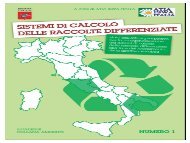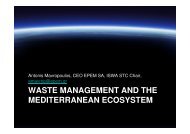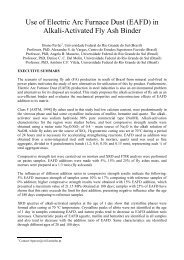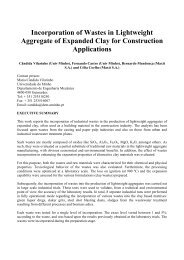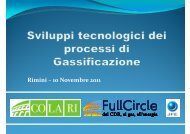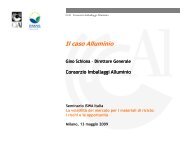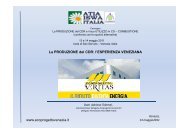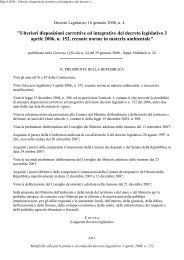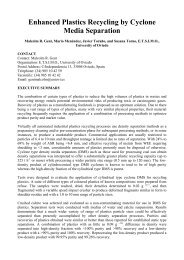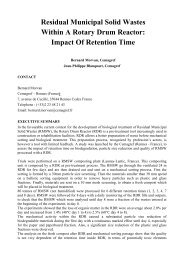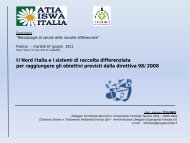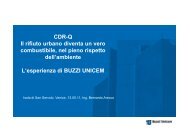Evolution of Packaging material sent to Recycling ... - ATIA-ISWA Italia
Evolution of Packaging material sent to Recycling ... - ATIA-ISWA Italia
Evolution of Packaging material sent to Recycling ... - ATIA-ISWA Italia
Create successful ePaper yourself
Turn your PDF publications into a flip-book with our unique Google optimized e-Paper software.
<strong>Evolution</strong> <strong>of</strong> <strong>Packaging</strong> <strong>material</strong> <strong>sent</strong> <strong>to</strong> <strong>Recycling</strong> in Algarve’s Area<br />
Idalécia Rodrigues (1)<br />
Summary<br />
______________________________________________________________<br />
Since 1998 the collection, sort and routing the packaging wastes, produced in<br />
The Algarve’s area is managed by ALGAR, entity responsible for Solid Waste<br />
Management System.<br />
In the last ten years, ALGAR has developed several awareness campaigns <strong>to</strong><br />
change the resident and non resident population behaviour, aiming for the<br />
correct deposit <strong>of</strong> recyclable <strong>material</strong>s in the ecopoints. These campaigns have<br />
been much diversified along the years. Here we can highlight the beach<br />
campaigns, several competitions, visits from students <strong>to</strong> the facilities, and more<br />
specialized raising awareness actions. The creation <strong>of</strong> an Educational<br />
Environment Centre and the existence <strong>of</strong> an Educational Environment Vehicle<br />
that goes trough the several schools <strong>of</strong> the 16 counties <strong>of</strong> Algarve, have<br />
contributed <strong>to</strong> the change <strong>of</strong> actions <strong>of</strong> school population, encouraging them <strong>to</strong><br />
develop a more correct environmental behaviour.<br />
The increase <strong>of</strong> ecopoints available for the population, with the initial goal <strong>of</strong> 1<br />
per 500 inhabitants back in 1998, <strong>to</strong> <strong>to</strong>day’s goal <strong>of</strong> 1 per 200 inhabitants, has<br />
well as the Environmental awareness raising campaigns, have generated an<br />
increasing in quantities <strong>of</strong> waste <strong>sent</strong> <strong>to</strong> recycling by Sociedade Pon<strong>to</strong> Verde<br />
(Green Point Society). The values <strong>of</strong> this growth are 571% between 1999 and<br />
2008, which repre<strong>sent</strong>s 3,442 <strong>to</strong>nes in 1999 and 23,079 <strong>to</strong>nes in 2008 (Chart<br />
1).<br />
(1) Pós-graduação em Gestão Ambiental, Coordenadora de Gestão de Informação da ALGAR, Rua Cândido<br />
Guerreiro nº 43, 3º d<strong>to</strong>, 8000-318 Faro- Portugal, +351289894480<br />
Idalecia.rodrigues@algar.com.pt
<strong>Evolution</strong> <strong>of</strong> <strong>Packaging</strong> <strong>sent</strong> <strong>to</strong> Recycking (<strong>to</strong>nes)<br />
Material/Year 1999 2000 2001 2002 2003 2004 2005 2006 2007 2008 Total<br />
Glass 2993.350 3904.640 5203.380 5401.380 6605.480 6930.760 7902.660 8978.928 10620.540 12965.740<br />
Paper/Card 339.090 622.230 1138.060 1157.590 1581.190 2668.030 3560.670 4096.206 5581.010 7194.810<br />
Plastic 90.420 246.080 313.220 343.260 481.920 748.345 924.930 1270.570 1328.884 1843.985<br />
Metal 18.740 26.180 41.960 69.780 83.620 124.160 179.740 214.600 183.060 356.480<br />
Wood<br />
71506.86<br />
27938.89<br />
7591.61<br />
1298.32<br />
0.000 0.000 10.820 148.660 262.240 180.320 292.540 420.840 646.440 718.440 2680.30<br />
Total 3441.600 4799.130 6707.440 7120.670 9014.450 10651.615 12860.540 14981.144 18359.934 23079.455 111015.978<br />
Chart 1 – <strong>Evolution</strong> <strong>of</strong> <strong>Packaging</strong> <strong>sent</strong> do <strong>Recycling</strong> (<strong>to</strong>nes)<br />
The contribution <strong>of</strong> the Algarve’s population on the correct deposit <strong>of</strong> recycling<br />
<strong>material</strong>s in the ecopoints helped in stabilizing the rate on scrap from the<br />
<strong>material</strong>s collected, decreasing the costs <strong>of</strong> collect and sort, es<strong>sent</strong>ial <strong>to</strong> this<br />
complex process.<br />
Regarding the area <strong>of</strong> new technologies, ALGAR has internally developed a<br />
specific s<strong>of</strong>tware <strong>to</strong> analyse and register the information from the selective<br />
collect – SAGIR, with the purpose <strong>of</strong> optimize the collecting system, improving<br />
the time <strong>to</strong> react on collecting <strong>of</strong> several containers, decreasing the collecting<br />
costs and the number <strong>of</strong> equipment in the limit <strong>of</strong> their fill in capacity, which<br />
promotes the use by the population.
According <strong>to</strong> information published by Sociedade Pon<strong>to</strong> Verde, in the last tree<br />
years ALGAR is the SMAUT – Sistemas Municipais e Autarquias (Municipal<br />
Systems and Counties) that contributes more in what concerns the recapture<br />
per capita <strong>to</strong> increase recycling in Portugal (considering the continent).<br />
In conclusion, ALGAR, along with the population <strong>of</strong> Algarve, promotes the<br />
sustainable development <strong>of</strong> the region, encouraging appropriate environmental<br />
behaviours.<br />
1 - Introduction<br />
During several decades the packaging has suffered transformations according<br />
<strong>to</strong> the evolution <strong>of</strong> civilizations, related <strong>to</strong> the needs and interests <strong>of</strong> the<br />
consumers, the markets’ competition, economic crises, the changes <strong>of</strong> food<br />
behaviours and life styles, as well as scientific and technological discoveries<br />
(Martinho et. al, 2007).<br />
Nowadays the packaging may be composed by several <strong>material</strong>s, and have<br />
many shapes and models, becoming es<strong>sent</strong>ial in the daily life <strong>of</strong> a person or in<br />
the activity <strong>of</strong> a company.<br />
The difficult biodegradation <strong>of</strong> some <strong>material</strong>s that compose the packaging, and<br />
their increasing quantities, are becoming an environmental problem. In a way <strong>of</strong><br />
trying <strong>to</strong> minimize the environmental impact <strong>of</strong> packaging, many producers are<br />
matching the functions <strong>of</strong> protection and promotion <strong>of</strong> the products with<br />
environmental measures.<br />
The role <strong>of</strong> the consumers is as much, or even more important, than the<br />
companies, regarding the environmental problems <strong>of</strong> packaging, since their<br />
attitudes and behaviour have a crucial role in reducing the environmental impact<br />
on packaging. The awareness <strong>of</strong> consumers for the use <strong>of</strong> recycled, recyclable<br />
and biodegradable products and their deposit on selective collection systems<br />
are some <strong>of</strong> the campaigns <strong>of</strong> several organizations, including Algar.<br />
The Algar, Valorização e Tratamen<strong>to</strong> de Resíduos Sólidos, S.A., was created in<br />
May, 20th 1995, by the Decre<strong>to</strong>-Lei n.º 109/95, which determines the creation <strong>of</strong><br />
a multidistrict system, meant <strong>to</strong> the Development, Conception, Construction and<br />
Exploring <strong>of</strong> a process <strong>of</strong> selective collection, sorting and treatment <strong>of</strong> solid<br />
urban waste <strong>of</strong> the Algarve.
2 – Development<br />
In the Algarve, the strategy <strong>of</strong> waste management included the creation <strong>of</strong> a<br />
multidistrict system, which involves the 16 districts; the EGF and the IPE, which<br />
resulted in the creation <strong>of</strong> ALGAR – Valorização e Tratamen<strong>to</strong> de Resíduos<br />
Sólidos S.A.<br />
Algar’s priorities were:<br />
Eradication <strong>of</strong> the 22 dumpsters <strong>of</strong> the area and their environmental<br />
requalification;<br />
Development <strong>of</strong> infrastructures for treatment and final depositing;<br />
Implementation <strong>of</strong> integrated system <strong>of</strong> selective collection and recovery<br />
<strong>of</strong> waste;<br />
Dynamization <strong>of</strong> awareness and education environment campaigns;<br />
2.1 – Environment Education<br />
Algar has promoted several activities in the environmental education area with<br />
the purpose <strong>of</strong> encourage environmentally sound practices in the resident<br />
population as well as visi<strong>to</strong>rs, in its place <strong>of</strong> action.<br />
The correct deposit <strong>of</strong> packaging in the recycling bin is the main theme in the<br />
awareness-raising sponsored by Algar. These activities are directed <strong>to</strong> Schools,<br />
Public Institutions, Hotels, Teaching Centres and Companies that intend <strong>to</strong><br />
clarify and promote their workers in the environmentally-sound practices.<br />
The awareness-raising campaigns developed by Algar regarding the selective<br />
collection <strong>of</strong> packaging have been much diversified along the years. Among<br />
those, we can highlight:<br />
<br />
<br />
the beach campaigns;<br />
several competitions (Competition <strong>of</strong> Mascot, Yellow alert, Mask<br />
competition, Pho<strong>to</strong>graph competition – Environmental shock (Picture 1)<br />
among others.
Picture 1 – Delivery <strong>of</strong> Certificate <strong>of</strong> Environmental Shock Competition<br />
Annually, Algar receives in its facilities thousands <strong>of</strong> visi<strong>to</strong>rs. The main goal <strong>of</strong><br />
these guide trips are <strong>to</strong> show in loco the different treatment processes used <strong>to</strong><br />
recycle the wastes in the Algarve.<br />
The creation <strong>of</strong> the Environment Educational Centre in Albufeira, turned <strong>to</strong> the<br />
sensibilization <strong>of</strong> the young people regarding the environment issues, like the<br />
importance <strong>of</strong> separation and recycling <strong>of</strong> packaging. It is through the eco-play<br />
and eco-learn that Algar develops the activities dedicated <strong>to</strong> the children, using<br />
the playing sense, connected <strong>to</strong> the ability <strong>of</strong> learning good environment<br />
actions.<br />
In the Environment Educational Centre there is a permanent exhibition that<br />
includes multimedia games about waste, a playground with several games,<br />
several ateliers on recycling and re-using <strong>material</strong>s, as well as several other<br />
activities <strong>of</strong> environmental education (Pictures 2, 3 e 4).<br />
Picture 2 - Educational games at the Environment Educational Centre in Albufeira
Picture 3 – Mural <strong>of</strong> the permanent exhibition at the Environment educational Centre in<br />
Albufeira<br />
Picture 4 – Reuse and recycling paper packaging atelier<br />
Algar has an Educational Environment Vehicle that goes through the 16<br />
counties <strong>of</strong> the Algarve, promoting good environmental practices. It is a semitrailer<br />
equipped with interactive multimedia <strong>material</strong>, focused on the young<br />
population, visiting schools, institutions and events (Pictures 5 and 6).<br />
Picture 5 – Exterior <strong>of</strong> the Educational Environment Vehicle
Picture 6 – Interior <strong>of</strong> the Educational Environment Vehicle<br />
2.2 – Localization <strong>of</strong> the Infrastructures<br />
Algar created several infrastructures for the recycling and treatment <strong>of</strong> urban<br />
solid waste:<br />
2 Sanitary Landfill;<br />
8 Transfer Stations;<br />
2 Stations <strong>of</strong> Screening;<br />
2 Composting Stations;<br />
13 Ecocentre;<br />
1 Environment educational Centre;<br />
The creation <strong>of</strong> these infrastructures spread over the Algarve has promoted the<br />
mobilization <strong>of</strong> the population <strong>to</strong> deposit <strong>material</strong>s in the waste managing<br />
system (Pictures 7).
Picture 7 – Map with the localization <strong>of</strong> the Infrastructures for the Treatment and <strong>Recycling</strong> <strong>of</strong><br />
Urban Solid Waste <strong>of</strong> the Algarve.<br />
Algar has increased dramatically the number <strong>of</strong> recycling containers available <strong>to</strong><br />
the population comparing <strong>to</strong> the initial goal back in 1988, with a ratio <strong>of</strong> 1<br />
ecopoint per 500 inhabitants. Today’s reality is <strong>of</strong> 1 ecopoint per 200<br />
inhabitants. The decrease <strong>of</strong> distance between consumers and ecopoints is an<br />
encouragement for its use, increasing the quantity <strong>of</strong> packaging collected.<br />
2.3 - Collection and sorting <strong>of</strong> packaging<br />
The packaging placed in ecopoints by the population is collected by Algar and<br />
<strong>sent</strong> <strong>to</strong> the Sorting Station. Here, the packaging is separated within types, and<br />
the non useful <strong>material</strong>, badly placed and refereed as scrap, is eliminated.<br />
Then, according <strong>to</strong> SIGRE - Sistema Integrado de Gestão de Resíduos de<br />
Embalagem, Algar forwards the waste for recycling though the SPV –<br />
Sociedade Pon<strong>to</strong> Verde, which is the entity at a national level for the recovery<br />
and recycling <strong>of</strong> packaging waste.<br />
Progressively Algar as raised the quantities <strong>of</strong> packaging forwarded <strong>to</strong> recycling<br />
trough SPV. The increase registered between 1999 and 2008 is quite high, so,
in the year <strong>of</strong> 1999 were forwarded 3,442 <strong>to</strong>nes and in 2008 this value raises <strong>to</strong><br />
23,079 <strong>to</strong>nes (Chart 1).<br />
<strong>Evolution</strong> <strong>of</strong> <strong>Packaging</strong> <strong>sent</strong> <strong>to</strong> Recycking (<strong>to</strong>nes)<br />
Material/Year 1999 2000 2001 2002 2003 2004 2005 2006 2007 2008 Total<br />
Glass 2993.350 3904.640 5203.380 5401.380 6605.480 6930.760 7902.660 8978.928 10620.540 12965.740<br />
71506.86<br />
Paper/Card 339.090 622.230 1138.060 1157.590 1581.190 2668.030 3560.670 4096.206 5581.010 7194.810<br />
27938.89<br />
Plastic 90.420 246.080 313.220 343.260 481.920 748.345 924.930 1270.570 1328.884 1843.985<br />
7591.61<br />
Metal 18.740 26.180 41.960 69.780 83.620 124.160 179.740 214.600 183.060 356.480<br />
1298.32<br />
Wood<br />
0.000 0.000 10.820 148.660 262.240 180.320 292.540 420.840 646.440 718.440 2680.30<br />
Total 3441.600 4799.130 6707.440 7120.670 9014.450 10651.615 12860.540 14981.144 18359.934 23079.455 111015.978<br />
Chart 1 – <strong>Evolution</strong> <strong>of</strong> <strong>Packaging</strong> <strong>sent</strong> do <strong>Recycling</strong> (<strong>to</strong>nes)<br />
The contribution <strong>of</strong> the Algarve’s population on the correct deposit <strong>of</strong> recycling<br />
<strong>material</strong>s in the ecopoints helped in stabilizing the rate on scrap from the<br />
<strong>material</strong>s collected (Chart 2), decreasing the costs <strong>of</strong> collection and sorting,<br />
es<strong>sent</strong>ial <strong>to</strong> this complex process.
Annual <strong>Evolution</strong> <strong>of</strong> the Percentage <strong>of</strong> Scrap on Sorting <strong>Packaging</strong><br />
% <strong>of</strong> Scra<br />
50<br />
45<br />
40<br />
35<br />
30<br />
25<br />
20<br />
15<br />
10<br />
5<br />
0<br />
2001 2002 2003 2004 2005 2006 2007 2008<br />
Paper/Card 2,28 1,93 2,75 5,65 4,43 4,12 4,13 3,48<br />
Plastic and Metal 25,27 33,41 37,17 34,96 38,67 36,34 43,57 34,22<br />
Glass 0 0 0 0 0 2,29 2,47 1,54<br />
Year<br />
Chart 2 – Annual <strong>Evolution</strong> <strong>of</strong> the Percentage <strong>of</strong> Scrap on Sorting <strong>Packaging</strong><br />
With the goal <strong>of</strong> optimizing the existing collection system, minimizing the time <strong>of</strong><br />
response on collecting the several <strong>material</strong> containers and decreasing<br />
economic costs related <strong>to</strong> selective collection, Algar developed specific s<strong>of</strong>tware<br />
for the analyses and registration <strong>of</strong> information regarding collection - SAGIR.<br />
The establishing <strong>of</strong> SAGIR, promoted an improvement <strong>of</strong> the service, since it<br />
allows the adequate management <strong>of</strong> human resources and <strong>material</strong>s available,<br />
reducing the number <strong>of</strong> equipments <strong>of</strong> selective collection in their limit filling<br />
capacity, promoting again, the use <strong>of</strong> these containers by the population,<br />
increasing the quantity <strong>of</strong> packaging deposited.<br />
3 – Conclusion<br />
The socio-economic development and the changes on life habits <strong>of</strong> the<br />
population explain the progressive increase on use <strong>of</strong> packaging in the daily life,<br />
implicating an increase <strong>of</strong> the waste.<br />
Over times, Algar as developed and contributed with diverse actions that helped<br />
for the awareness on population regarding the adoption <strong>of</strong> environmentally<br />
sound behaviour.
The increase <strong>of</strong> quantities <strong>of</strong> packaging collected and forwarded for recycling is<br />
one <strong>of</strong> the visible and immediate effects <strong>of</strong> this change on behaviour <strong>of</strong> the<br />
population.<br />
According <strong>to</strong> information published by Sociedade Pon<strong>to</strong> Verde, in the last three<br />
years ALGAR is the SMAUT – Sistemas Municipais e Autarquias (Municipal<br />
Systems and Counties) that contributes more in what concerns the recapture<br />
per capita <strong>to</strong> increase recycling in Portugal (considering the continent).<br />
In conclusion, ALGAR, along with the population <strong>of</strong> Algarve, promotes the<br />
sustainable development <strong>of</strong> the region, encouraging appropriate environmental<br />
behaviours.<br />
4 – Bibliografia<br />
MARTINHO, M.G.; Rodrigues, S.A. (2007) – His<strong>to</strong>ria da Produção e<br />
Reciclagem das Embalagens em Portugal, Novembro de 2007.



